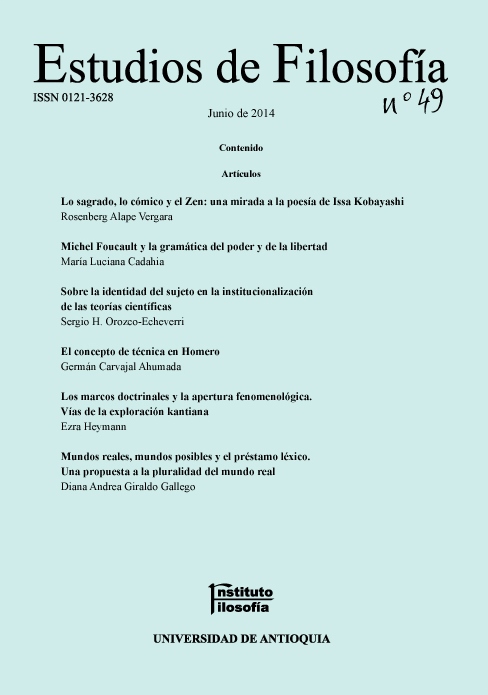The concept of techne in Homer
DOI:
https://doi.org/10.17533/udea.ef.19431Keywords:
Homer, technique, knowledge, Iliad, Odyssey.Abstract
This article seeks to demonstrate that the concept of technique in the Homeric poems, the Iliad and Odyssey, does not refer exclusively to an intellectual attribute. The thesis here is that the concept, as developed by Homer, points to a perception that is of a tangible or intellectual order and that allows for the development of the subject in a situational environment. In the Homeric poems, the development of the text is a review of the forms of appearance of the concept so as to isolate its essential meaning: first in the Iliad, then in the Odyssey, and finally, in the relationship that this concept maintains with the notion of knowledge.
Downloads
References
CALASSO, R. (1994) The Marriage of Cadmus and Harmony. Translated from the Italian by Tim Parks. Vintage.
DETIENNE, M. (1990) La escritura de Orfeo. Traducción de Marco Aurelio Galmarini. Ediciones Península.
HEIDEGGER, M. (1994) “La pregunta por la técnica”. En: Conferencias y Artículos. Traducción de Eustaquio Barjau. Ediciones del Serbal, Barcelona, Barcelona, pp. 9 – 37.
HOMER. (1920)“Iliad”. In: Homeri Opera in five volumes. Oxford, Oxford University Press. DOI: https://doi.org/10.1093/oseo/instance.00280622
HOMER. (1919) The Odyssey, with an English Translation by A.T. Murray, PH.D. in two volumes. Cambridge, MA. Harvard University Press; London, William Heinemann, Ltd.
HOMER. (1914) “Hymn to Hephaestus”. En: Anonymous. The Homeric Hymns and Homerica, with an English Translation by Hugh G. Evelyn-White. Homeric Hymns. Cambridge, MA., Harvard University Press; London, William Heinemann Ltd.
HOMERO. (1953) Iliada. Traslación en verso por Fernando Gutiérrez. José Janés Editor, Barcelona.
ROOCHNIK, D. (1996) Of Art and Wisdom. Plato’s understanding of Techne. The Pennsilvania State University Press.
VERDAN, S. (2007) “Systèmes numéraux en Grèce ancienne: description et mise en perspective historique”. En: Culture MATH.
Downloads
Published
How to Cite
Issue
Section
Categories
License
Copyright (c) 2014 Germán Carvajal Ahumada

This work is licensed under a Creative Commons Attribution-NonCommercial-ShareAlike 4.0 International License.
Authors who publish with this journal agree to the following terms:
1. The Author retains copyright in the Work, where the term "Work" shall include all digital objects that may result in subsequent electronic publication or distribution.
2. Upon acceptance of the Work, the author shall grant to the Publisher the right of first publication of the Work.
3. The Author shall grant to the Publisher a nonexclusive perpetual right and license to publish, archive, and make accessible the Work in whole or in part in all forms of media now or hereafter known under a Creative Commons Attribution-NoCommercia-ShareAlike (CC BY-NC-SA 4.0), or its equivalent, which, for the avoidance of doubt, allows others to copy, distribute, and transmit the Work under the following conditions: (a) Attribution: Other users must attribute the Work in the manner specified by the author as indicated on the journal Web site;(b) Noncommercial: Other users (including Publisher) may not use this Work for commercial purposes;
4. The Author is able to enter into separate, additional contractual arrangements for the nonexclusive distribution of the journal's published version of the Work (e.g., post it to an institutional repository or publish it in a book), as long as there is provided in the document an acknowledgement of its initial publication in this journal;
5. Authors are permitted, and Estudios de Filosofía promotes, to post online the preprint manuscript of the Work in institutional repositories or on their Websites prior to and during the submission process, as it can lead to productive exchanges, as well as earlier and greater citation of published work (see The Effect of Open Access). Any such posting made before acceptance and publication of the Work is expected be updated upon publication to include a reference to the Estudios de Filosofía's assigned URL to the Article and its final published version in Estudios de Filosofía.















